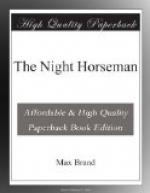He had stopped just opposite O’Brien’s hotel, store, blacksmith shop, and saloon, and by the hitching rack was a black stallion. Now, there are some men who carry tidings of their inward strength stamped on their foreheads and written in their eyes. In times of crises crowds will turn to such men and follow them as soldiers follow a captain; for it is patent at a glance that this is a man of men. It is likewise true that there are horses which stand out among their fellows, and this was such a horse. He was such a creature that, if he had been led to a barrier, the entire crowd at the race track would rise as one man and say: “What is that horse?” There were points in which some critics would find fault; most of the men of the mountain-desert; for instance, would have said that the animal was too lightly and delicately limbed for long endurance; but as the man of men bears the stamp of his greatness in his forehead and his eyes, so it was with the black stallion. When the thunder of the cavalcade had rushed upon him down the street he had turned with catlike grace and raised his head to see; and his forehead and his eyes arrested Jerry Strann like a levelled rifle. Looking at that proud head one forgot the body of the horse, the symmetry of curves exquisite beyond the sculptor’s dream, the arching neck and the steel muscles; one was only conscious of the great spirit. In Human beings we refer to it as “personality.”
After a little pause, seeing that no one offered a suggestion as to the identity of the owner, Strann said, softly: “That hoss is mine.”
It caused a stir in the crowd of his followers. In the mountain-desert one may deal lightly with a man’s wife and lift a random cow or two and settle the score, at need, with a snug “forty-five” chunk of lead. But with horses it is different. A horse in the mountain-desert lies outside of all laws—and above all laws. It is greater than honour and dearer than love, and when a man’s horse is taken from him the men of the desert gather together and hunt the thief whether it be a day or whether it be a month, and when they have reached him they shoot him like a dog and leave his flesh to the buzzards and his bones to the merciless stars. For all of this there is a reason. But Jerry Strann swung from his mount, tossed the reins over the head of the chestnut, and walked towards the black with hungry eyes. He was careless, also, and venturing too close—the black whirled with his sudden, catlike agility, and two black hoofs lashed within a hair’s breadth of the man’s shoulder. There was a shout from the crowd, but Jerry Strann stepped back and smiled so that his teeth showed.
“Boys,” he said, but he was really speaking to himself, “there’s nothing in the world I want as bad as I want that hoss. Nothing! I’m going to buy him; where’s the owner?”
“Don’t look like a hoss a man would want to sell, Jerry,” came a suggestion from the cavalcade, who had dismounted and now pressed behind their leader.




